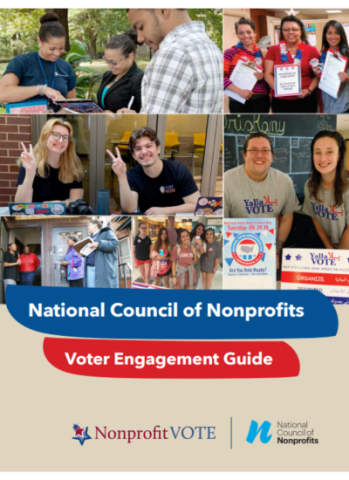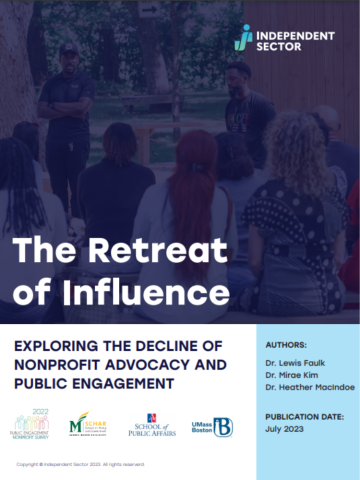Census 2020 Key Resources
This is a collection of resources developed to support a complete and accurate count in Census 2020.
This is a collection of resources developed to support a complete and accurate count in Census 2020.

The National Council of Nonprofits has created a nonpartisan Voter Engagement Guide, which provides a roadmap of permitted nonpartisan activities and highlights how charitable nonprofits can effectively engage in elections on a nonpartisan basis, leverage their networks for greater impact and build relationships with elected officials.

This report from Independent Sector, The Retreat of Influence: Exploring the Decline of Nonprofit Advocacy and Public Engagement, explores how advocacy and civic engagement may vary by organization size, geography, communities served, and leadership demographics.
Independent Sector's study reveals that the estimated value of a volunteer hour reached $23.07 in 2014, up $2.22 from 2009. According to the Financial Accounting Standards Board, the value of volunteer services can also be used on financial statements - including statements used for internal and external purposes, grant proposals, and annual reports - if a volunteer is contributing a specialized skill to a nonprofit.
Whether your philanthropy quest is to end homelessness, fight poverty, enable gender and racial equality, lower teen pregnancy rates, or provide a path to college for disadvantaged youth, government funding and policy are bound to affect your results. This is especially true in today's climate of fiscal austerity and political polarization.
As an example, consider work towards ending homelessness. Chances are that any homeless shelter you would choose to fund draws most of its revenue from government and is seeing that revenue steadily decline, which puts more pressure on its already unsteady finances. Even if a particular nonprofit has foregone government funding, as some do, it will now be seeking private funding in a much more competitive philanthropic market as peer organizations seek to backfill shrinking public funds
Since success in philanthropy often depends on working with or around government, we've put together advice on how to approach these collaborations. The first section covers some promising approaches to how philanthropy can work in partnership with, or to accelerate the work of government. The second discusses how some innovative city leaders and their partners are using data to make headway on social progress and ways philanthropists can help. The third discusses community collaboratives, through which leaders from government, nonprofit, philanthropy, and business are truly moving the needle on challenging social issues—and how they're making that happen.
This report contains three sections:
Three Approaches to Working with and Around Government
Geek Cities: How Data is Fostering Social Progress
How Some Community Collaboratives Are Moving the Needle on Change
The legal staff at the Packard Foundation, Gates Foundation, Hewlett Foundation and Moore Foundation developed this free, first-of-its-kind resource, which covers the basic legal rules around what staff are allowed to fund and engage in at a private foundation.
The goal of this collaboration is to create online, web-based trainings to supplement existing in-person training programs. The Foundations identified a shared need for this type of instructional resource, and a common desire to collaboratively develop a training system that speaks to a variety of learning styles and organizational training needs.
As a result, the Foundations developed Learn Foundation Law, a free first-of-its-kind resource for private foundations (and others who are interested), to host e-trainings and tools related to the basic legal rules for private foundations. Most e-learnings developed by the Foundations take less than one hour to complete and feature a program officer named Maya who leads participants through each course. Participants can return to any training at any time for a refresher and click on individual modules to refer back to specific topics. In addition, other e-learnings developed by any one of the Foundations may also be hosted on this site.